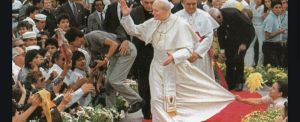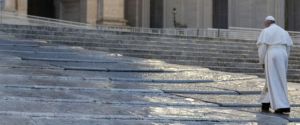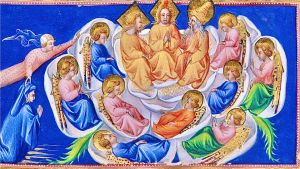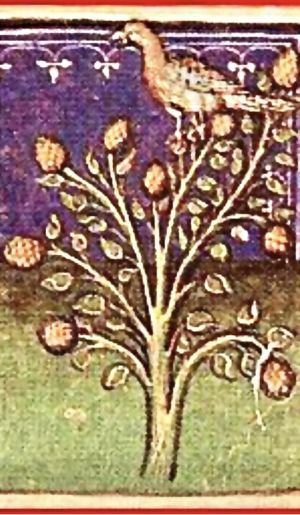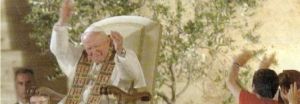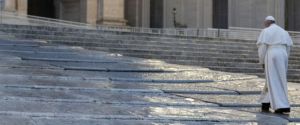
don Giuseppe Nespeca
Giuseppe Nespeca è architetto e sacerdote. Cultore della Sacra scrittura è autore della raccolta "Due Fuochi due Vie - Religione e Fede, Vangeli e Tao"; coautore del libro "Dialogo e Solstizio".
A mixture of fear and trust, or total and pure abandonment
We have just heard the Gospel reading of the calming of the storm, which was presented with a brief but incisive passage from the Book of Job, in which God reveals himself as the Lord of the sea. Jesus rebukes the wind and orders the sea to be calm, he speaks to it as if it were identified with the power of the devil. In fact, according to what the First Reading and Psalm 107[106] tell us, in the Bible the sea is considered a threatening, chaotic and potentially destructive element which God the Creator alone can dominate, govern and calm.
Yet, there is another force a positive force that moves the world, capable of transforming and renewing creatures: the power of "Christ's love" (2 Cor 5: 14) as St Paul calls it in his Second Letter to the Corinthians not, therefore essentially a cosmic force, but rather divine, transcendent. It also acts on the cosmos but, in itself, Christ's love is "another" power and the Lord manifested this transcendent otherness in his Pasch, in the "holiness" of the "way" he chose to free us from the dominion of evil, as happened for the Exodus when he brought the Jews out of Egypt through the waters of the Red Sea. "Your way, O God, is holy", the Psalmist exclaims, "Your way was through the sea/ your path through the great waters" (Ps 77[76]: 13, 19). In the Paschal Mystery, Jesus passed through the abyss of death, because in this way God wanted to renew the universe through the death and Resurrection of his Son, who "died for all", that all might live "for him who for their sake died and was raised" (2 Cor 5: 15), and not live for their own sake alone.
The solemn gesture of calming the stormy sea was a clear sign of Christ's lordship over negative powers and induces one to think of his divinity: "Who then is this", his own Disciples asked fearfully, "that even wind and sea obey him?" (Mk 4: 41). Their faith is not yet firm, it is being formed; it is a mingling of fear and trust; on the other hand, Jesus' confidant abandonment to the Father is total and pure. This is why he could sleep during the storm, completely safe in God's arms. The time would come, however, when Jesus too would feel fear and anguish, when his hour came he was to feel the full burden of humanity's sins upon him, like a wave at high tide about to break over him. That was indeed to be a terrible tempest, not cosmic but spiritual. It was to be the final, extreme assault of evil against the Son of God.
Yet, in that hour Jesus did not doubt in the power of God the Father or in his closeness, even though he had to experience to the full the distance of hatred from love, of falsehood from the truth, of sin from grace. He experienced this drama in himself with excruciating pain, especially in Gethsemane, before his arrest, and then throughout his Passion until his death on the Cross. In that hour, Jesus on the one hand was one with the Father, fully abandoned to him; on the other, since he showed solidarity to sinners, he was as it were separated and felt abandoned by Him.
[Pope Benedict, homily 21 June 2009]
Sign of a constant Presence
The storm calmed on the Lake of Genesaret can be reread as a "sign" of Christ's constant presence in the "boat" of the Church, which many times throughout history is exposed to the fury of the winds during stormy hours. Jesus, awakened by the disciples, commands the winds and the sea to be becalmed. Then he says to them, "Why are you so fearful? Have you no faith yet?" (Mk 4:40). In this, as in other episodes, one can see Jesus' desire to inculcate in the apostles and disciples faith in his operative and protective presence even in the most stormy hours of history, in which doubt about his divine assistance could infiltrate the spirit. In fact, in Christian homiletics and spirituality, the miracle has often been interpreted as a 'sign' of Jesus' presence and a guarantee of trust in him on the part of Christians and the Church.
[Pope John Paul II, General Audience 2 December 1987]
Against the tidal waves, one must look to the Lord and raise one's voice
Today’s liturgy tells the episode of the storm calmed by Jesus (Mk 4:35-41). The boat in which the disciples are crossing the lake is beaten by the wind and the waves and they fear they will sink. Jesus is with them on the boat, yet he is in the stern asleep on the cushion. Filled with fear, the disciples cry out to him: “Teacher, do you not care if we perish?” (v. 38).
And quite often we too, beaten by the trials of life, have cried out to the Lord: “Why do you remain silent and do nothing for me?”. Especially when it seems we are sinking, because love or the project in which we had laid great hopes disappears; or when we are at the mercy of unrelenting waves of anxiety; or when we feel we are drowning in problems or lost amid the sea of life, with no course and no harbour. Or even, in moments in which the strength to go forward fails us, because we have no job, or an unexpected diagnosis makes us fear for our health or that of a loved one. There are many moments when we feel we are in a storm; when we feel we are almost done in.
In these situations and in many others, we too feel suffocated by fear and, like the disciples, risk losing sight of the most important thing. In the boat, in fact, even if he is sleeping, Jesus is there, and he shares with his own all that is happening. If on the one hand his slumber surprises us, on the other, it puts us to the test. The Lord is there, present; indeed, he waits — so to speak — for us to engage him, to invoke him, to put him at the centre of what we are experiencing. His slumber causes us to wake up. Because to be disciples of Jesus, it is not enough to believe God is there, that he exists, but we must put ourselves out there with him; we must also raise our voice with him. Hear this: we must cry out to him. Prayer is often a cry: “Lord, save me!”. I was watching, on the programme “In his Image”, today, the Day of Refugees, many who come in large boats and at the moment of drowning cry out: “Save us!”. In our life too the same thing happens: “Lord, save us!”, and prayer becomes a cry.
Today we can ask ourselves: what are the winds that beat against my life? What are the waves that hinder my navigation, and put my spiritual life, my family life, even my psychological life in danger? Let us say all this to Jesus; let us tell him everything. He wants this; he wants us to grab hold of him to find shelter from the unexpected waves in life. The Gospel recounts that the disciples approach Jesus, wake him and speak to him (cf. v. 38). This is the beginning of our faith: to recognize that alone we are unable to stay afloat; that we need Jesus like sailors need the stars to find their course. Faith begins from believing that we are not enough for ourselves, from feeling in need of God. When we overcome the temptation to close ourselves off, when we overcome the false religiosity that does not want to disturb God, when we cry out to him, he can work wonders in us. It is the gentle and extraordinary power of prayer, which works miracles.
Jesus, begged by the disciples, calms the wind and waves. And he asks them a question, a question which also pertains to us: “Why are you afraid? Have you no faith?” (v. 40). The disciples were gripped with fear, because they were focused on the waves more than on looking at Jesus. And fear leads us to look at the difficulties, the awful problems, and not to look at the Lord, who many times is sleeping. It is this way for us too: how often we remain fixated on problems rather than going to the Lord and casting our concerns to him! How often we leave the Lord in a corner, at the bottom of the boat of life, to wake him only in a moment of need! Today, let us ask for the grace of a faith that never tires of seeking the Lord, of knocking at the door of his Heart. May the Virgin Mary, who in her life never stopped trusting in God, reawaken in us the basic need of entrusting ourselves to him each day.
[Pope Francis, Angelus 20 June 2021]
Blessed are the poor in spirit, because of the Holy Spirit
Rhythm of Nature. The evolutionary factor
From below, not from a summit
(Mk 4: 26-34)
Here we are introduced to a different mentality, to a new Family, to another Kingdom, not very "elevated"; indeed, completely reversed. Different from that expected on a mighty mountain (Ez 17:22).
It will not be portrayed by the majesty of the cedar of Lebanon [which once covered the mountain slopes of the Near East] but by a simple shrub in the kitchen garden (Mk 4:32a).
And the very origins of this new reality will not come from the top of a lofty stem, but from a small seed, simply planted on the ground.
Little grain like the others. Nothing remarkable in itself. Which develops horizontally, rather (v.32b).
How much gas must be given to accelerate the spread of the Kingdom?
According to Jesus, we must wait for everyone to meet himself, without neuroses.
A proposal that knows no borders: it’s aimed at everyone. It is enough to let the grain do its normal things - thus integrating the energies; giving space, even giving way.
The Seed grows on its own, intertwined with the soil and climate, yet according to a deep individual character.
He escapes cerebral explanations: «How, it itself does not know» (v.27).
After sowing, the author of the gesture resumes normal life.
Letting it go, the little hidden grain walks its way, to the end.
This is the evolutionary factor.
No farmer tramples on his field, nor investigates what happens (bothering the seedlings): development, growth and maturation are in themselves guaranteed.
Anyone who wants to enter would disturb the sprouts.
Whoever dug to control the evolution of little bud that is intertwining its roots with the ground, would ruin everything.
Our sacred identity is inextricably linked to personal singularity: it entangles with an unrepeatable sensitivity and vicissitude.
It’s the darkness, the silence, the waiting, that make tender shoots sprout, in their uniqueness and authenticity.
They would only be harmed by the one who wanted to interfere, modifying, overlapping other patterns and trends - never conforming to the realities in spontaneous singular development.
Beware of the hastiness of those who immediately want a result other than to be ourselves in relation to the innate essence and personal mission, which emanate from the hidden Source.
Time of love is not immediate: it takes place along a path, whose periods cannot be marked by any hasty plan - only irritating - if not by the Spirit, so that we can manifest the intrinsic unprecedented.
No one can bother such exceptional wealth, which arises and develops «automatically» (v.28), so that we are enabled to give birth to the inner world, the quintessence, the Jesus who hatches in heart; not others.
«Laying hold of the scythe» (v.29) means that at this point the soul is awakened for the Kingdom, ready to ‘give life’ to itself and to brethren, overflowing its wholeness to others, even distant or wandering like birds (v.32).
Together, a Church that - without thinking too much about "how it should be" - convinces all those in need of shelter from the "heat".
And Seed can be transmitted anywhere by the same «volatiles» that settle there even just enough for each one to take flight again.
‘Parables of the kingdom’ in Mt 13 and here in Mk 4 do not narrate a solemn, epochal, majestic reality that stubborns and imposes itself.
Rather, the new kingdom will be comparable to a common shrub, which grows modestly - silent, in the home garden (v.32).
As if to say: we evolve into tiny signs - nothing extraordinary - but we are people, not facsimiles.
Thus we announce Paradise.
[Friday 3rd wk. in O.T. January 30, 2026]
Rhythm of Nature. The evolutionary factor
From below, not from a summit
(Mk 4: 26-34)
Here we are introduced to a different mentality, to a new Family, to another Kingdom, not very "elevated"; indeed, completely reversed. Different from that expected on a mighty mountain (Ez 17:22).
It will not be portrayed by the majesty of the cedar of Lebanon [which once covered the mountain slopes of the Near East] but by a simple shrub in the kitchen garden (Mk 4:32a).
And the very origins of this new reality will not come from the top of a lofty stem, but from a small seed, simply planted on the ground.
Little grain like the others. Nothing remarkable in itself. Which develops horizontally, rather (v.32b).
How much gas must be given to accelerate the spread of the Kingdom? According to Jesus, one must wait for each one to meet himself, without neurosis.
The Kingdom of God is the sphere in which He reigns: the alternative society that believers inaugurate here, not looking nose-up at the afterlife.
The new reality will transcend time, because it is characterised by love for all: it will transcend the chronicle and even history.
This is also why the Gospels do not borrow images mediated by a particular cult and the sacred.
To make it clear that the Churches are not even limited to the earthly spatial-temporal dimension, the Master pretends not to know that - even at a slow pace - after sowing, the farmer cleans the field, protects the scattered seed, irrigates.
It is not amnesia his, but a special emphasis on what counts and distinguishes the soul's affair, contended between religiosity and Faith.
The image is simple, paradoxically mediated by the culture of the fields - to explain the rhythm of life in the Spirit.
It will sprout from the soil, sprout and blossom on a foundation that is not shaky, a genuine foundation without vocational dissent, far from external prejudices - which we detest underneath.
Then, on the horizon of every stretch of the journey there is always a new plant, another genesis, a different flowering in the time of the seasons, a different effervescence to be introduced into the already capitalised arrangement.
In commentary on the Tao Tê Ching (ix), Master Wang Pi writes: "The four seasons succeed one another. When their work is done, they pass away'.
A proposal that knows no borders, it appeals to all. Just let the seed do its normal thing - thus integrating energies; giving space, and even yielding.
[This would ensure the continued attraction and maturation of people and communities].
It is not an esoteric ideal, measured on people set apart, exceptionally gifted, particular, and titled: it is for the "ordinary" man (v.26) - but not scatter-brained, and who at the moment when he has to activate himself casts aside, that is, destined for all mankind.
Then he waits, and it is here that he lays down voluntarism and opens the door to the dreaming side - no longer trying to correct spontaneous processes and set things right according to his head.
In fact, in vv. 26-29, the work of the farmer is reduced to: sowing the seed and putting his hand to the sickle [in the ancient world, not the time of verification and reckoning, but the turning point of the feast that made everyone feel fulfilled, and everyone rejoice].
The focus of life in the Spirit escapes the person's stubbornly active work.
The seed-Word-event is planted underground, stands in the dark, rots and takes root, without anyone being able to accelerate its development, or later pull up the shrub to make it stand out.
As the Tao (ix) says: 'He who fills up what he possesses, had better desist' - and even 'when the work is done, to withdraw is the Way of Heaven'.
Jesus does not say that God's Blessing can possibly be thrown into a narrow field, as a careful miser would do: the Message of Salvation must be radiated unsparingly.
His Word opens the brain and limits sectarian thoughts, inviting one to overlook any temptation to exclusivism and define boundaries. Why?
The Seed has a vitality of its own, which does not depend on the outside. An ivy climbs, an oak tree takes root; an undergrowth flower knows how to stay in the shade, a sunflower soars; so on.
The Grain is even capable of self-healing - thus leading to a process of more solid self-healing.
This Grain of the Word (in us: the personal Calling) possesses a silent power, a hidden, yet irresistible direction and strength - not dependent on emotional swings or advantageous situations.
Easily it can be trampled upon, but the vocation recoils.
The more you stifle it, the more it re-enters with renewed energy.
We cannot deny our inclination, except by strengthening it - or by creating and accentuating discomforts on an identity [not character] basis, i.e. not our own.
One Mission is not worth the other.
The Seed grows on its own, intertwined with the soil and the climate, yet according to deep individual character.
It defies cerebral explanation: 'How, he himself does not know' (v.27).
After the sowing season, it is useless - indeed, harmful - to attempt to drug the path of growth.
Nothing but a rhythm of spontaneous development can properly direct existence.
In fact, the doer resumes normal life.
Left to its own devices, the little hidden grain goes its own way, all the way down.
This is the evolutionary factor.
No farmer tramples on his field, nor does he investigate what is going on, importuning: development, growth and ripening are guaranteed for himself.
He who would enter would disturb the shoots.
Whoever would dig to check the grain that is intertwining its roots with the soil would ruin everything.Our sacred identity is inextricably bound up with personal singularity: it is entangled with an unrepeatable sensitivity and vicissitude.
Here, becoming One with the perennial Infant Christ, we recognise Him in us - and then we bear fruit.
It is the darkness, the silence, the waiting, that make the tender shoots sprout, in their uniqueness and authenticity.
It would only damage them if one wanted to interfere, modifying, superimposing patterns and trends... never conforming to realities in spontaneous singular development.
It is the classic forcing of those who must at all costs condition us, and impose beliefs that have nothing to do with it.
The result is an abortion, caused by external influence [indeed, of nosy 'guides'] that easily stunts development.
When we put prejudices and beliefs aside and let go of the instinct that sees the divine self, faithful in growth and surprises, we will be enchanted and amazed.
We will have confirmation of what we sensed: ours - so lived, intense, fragrant - is a profound and sensitive intelligence.
The assimilation of the Word of God and the call of the creaturely vocation intertwine in time.
Beware of the precipitation of those who immediately want a 'result' that is not to be ourselves in relation to the innate quintessence and personal mission, which emanate from the hidden Source.
[The anger that is sometimes triggered also brings authenticity out into the open. So that we manifest the kernel of unrepeatable inclination].
In short, the time of love is not immediate, it unfolds along a path, whose periods cannot be marked by hasty designs or spiritual guides, only irritating - if not by the 'Spirit'.
"Holy" because by its Action it cuts off the germs of death; it helps to distinguish what is life, and wants us to manifest the inherent unseen.
"Ruah haQodesh": the only trustworthy, inherent, caring Master, endowed with an unclouded mind. From the disruptive force - which throws all organised, 'safe' and too cerebral reality into the air; therefore close to death.
The dynamism may be very slow, but no one will stop it, despite the destruction it has suffered. It will pick up again after humiliations and holes in the water.
These are lacerating moments, but they are reinterpreted by the soul on the journey as precious indications: prohibitions of access and ways out, if not precise signals.
That is why - after transmitting the Message - no running: one must have respect for space and time for growth.
If the Word of God does not intertwine its vital course with the individual subject's life story, there is a risk of anaesthetising or alienating precisely the most motivated souls - albeit unskilled in terms of cunning; weak, sensitive.
It is then useless to defuse the symptoms of malaise when someone feels held hostage - a stranger to himself.
If we are forced to remove or hide our authentic emotions from the homologising opinions of the 'best', we will vainly resemble them - dispersing the richness of our Name.
If the expert, instead of helping to broaden the panorama, were to impose no change, the person who allows himself to be plagiarised would not rediscover his own simplicity.
And life (even that spent most nobly, in the gift of self) would sooner or later become a nightmare, constantly subject to manipulation, just around the corner.
Indeed, Jesus could not stand managers who pretended to intervene with their conformism and 'proper' lifestyles.
Enough, then, of "regents" who place under an asphyxiating cloak the path that is ours by nature.
There are times when the feverish and pressing work must go into the background, so that the masterpiece we are inside can grow on its own.
Thus the fruit will surprise and exceed normal or prescribed expectations.
If the beginning is small and hidden, the inner call will go in symbiosis with that of the Word.
In this way, even the call of events and the genius of the time will be well interpreted and assimilated, within the extraordinary nature of each.
Jesus seems to be against the work of directors who control the movement and behaviour [of all others - except their own].
They must only unfold the Message, not their own opinion; then keep silent and do not meddle in the affairs of others.
Only - try to foster the assimilation of the Word, and the multifaceted pursuit of one's outspoken character.
The natural path goes and evolves in symbiosis with a process of rooting God's Proclamation in us on our ledges.
No one can disturb this exceptional richness, which is born and develops 'automatically' (v.28 Greek text) so that we are enabled to give birth to the inner world, the essence, the Jesus that broods in our hearts; not others.
Incarnation: it only continues and enriches if we do not delegate the unparalleled freedom of movement.Unparalleled breath that acts as a catalyst for exceptional, unrepeatable, singularly individual though related potentialities; to full maturity.
Life always develops in such a way that it can be difficult for us to understand - but in the experience of fullness of being and inner attunement with oneself, there is not so much to understand as to experience.
The result will be an out-scaling that realises in the round, on every side the inclination of the person.
Like a gradual unfolding that then channels itself into a particular trajectory - now made astounding also in terms of relationships: already blissful; exuberant, luxuriant.
Personal and selfless.
"Laying hold of the sickle" (v.29) means that at this point the person of Faith is awakened for the Kingdom, ready to give life to himself and his brethren. Overflowing its experience of wholeness to others, even distant or wandering like birds (v.32).
Together, a Church that - without thinking too much about 'how it should be' - convinces all those in need of shelter from arsure.
An experience that will convince them, only if as sons and brothers we have listened to that need for listening and understanding - sometimes so unexpressed. Recharging passion, rekindling insight and life.
The Seed can be transmitted everywhere by the same "birds" (once only distant) that alight there, more or less enough for each one to take flight again and propose themselves to others - elsewhere - with interest.
The Kingdom of God is a living community, made up of believers who move and wait, transform and pull out of the field every varied, unconscious and dormant resource.
[The unexplored side - in fact - does not attract the attention of just any master. And the quality not designated from the outside is also likely to be overlooked, because it is not very magnificent (often not even explicit)].
"And he said: How shall we compare the Kingdom of God? Or in what parable shall we put it? Like a grain of mustard seed that when sown on the earth is smaller than all the seeds on earth" (Mk 4:30-31).
In short, the parables of the kingdom in Mt 13 and here in Mk 4 do not narrate a solemn, epochal, majestic, peremptory reality, which is self-evident and imposing.
Rather, the new kingdom will be likened to a common shrub, growing modestly - silently, in the kitchen garden (v.32) - among aubergines, lettuce, and cucumbers; daisies, weeds, and violets.
But for each one and without bounds.
To say: we each evolve into tiny signs - nothing extraordinary - but we are well-rounded persons, not puppets or facsimiles, nor merely extensions of the past.
We are not by character - we want to free ourselves from others' models - nor by prestige or unreachable (but trivial) excellence and showy grandiosity.
We remain nothing much, like the flowers of the undergrowth, or at most spinach; but we want to express ourselves without forcing.
We long to feel our vital energy circulating, leading out of the tedious, rambling herd.
After all, one can also love poorly - not something predictable, or someone who conditions and overpowers us.
Nightmares dissolve. This is how we proclaim Paradise.
To internalise and live the message:
What sense does the small hope of a few believers without a conspicuous, self-confident, doctrinal, and voluntarist heritage have for the social and cultural concert - today global -?
Rhythm Growth Contrast
Dear Brothers and Sisters,
Today’s liturgy presents to us two short parables of Jesus: the parable of the seed that grows of its own accord and the parable of the mustard seed (cf. Mk 4:26-34). With images taken from the farming world the Lord presents the mystery of the Word and of the Kingdom of God, and points out the reasons for our hope and our dedication.
In the first parable the focus is on the dynamism of the sowing: the seed that was scattered on the land sprouts and grows by itself, whether the peasant is awake or asleep. The man sows with the trust that his work will not be fruitless. What supports the farmer in his daily efforts is specifically trust in the power of the seed and in the goodness of the soil. This parable recalls the mysteries of the creation and of redemption, of God’s fertile work in history. It is he who is the Lord of the Kingdom, man is his humble collaborator who contemplates and rejoices in the divine creative action and patiently awaits its fruits. The final harvest makes us think of God’s conclusive intervention at the end of time, when he will fully establish his Kingdom. The present is the time of sowing, and the growth of the seed is assured by the Lord. Every Christian therefore knows well that he must do all he can, but that the final result depends on God: this awareness sustains him in his daily efforts, especially in difficult situations. St Ignatius of Loyola wrote in this regard: “Act as though everything depended on you, but in the knowledge that really everything depends on God” (cf. Pedro de Ribadeneira, Vita di S. Ignazio di Loyola, Milan, 1998).
The second parable also uses the image of the seed. Here, however, it is a specific seed, the mustard seed, considered the smallest of all seeds. Yet even though it is so tiny, it is full of life; it breaks open to give life to a sprout that can break through the ground, coming out into the sunlight and growing until it becomes “the greatest of all shrubs” (Mk 4:32): the seed’s weakness is its strength, its breaking open is its power. Thus the Kingdom of God is like this: a humanly small reality, made up of those who are poor in heart, of those who do not rely on their own power but on that of the love of God, on those who are not important in the world’s eyes; and yet it is through them that Christ’s power bursts in and transforms what is seemingly insignificant.
The image of the seed is especially dear to Jesus, because it clearly expresses the mystery of the Kingdom of God. In today’s two parables it represents “growth” and “contrast”: the growth that occurs thanks to an innate dynamism within the seed itself and the contrast that exists between the minuscule size of the seed and the greatness of what it produces.
The message is clear: even though the Kingdom of God demands our collaboration, it is first and foremost a gift of the Lord, a grace that precedes man and his works. If our own small strength, apparently powerless in the face of the world’s problems, is inserted in that of God it fears no obstacles because the Lord’s victory is guaranteed. It is the miracle of the love of God who causes every seed of good that is scattered on the ground to germinate. And the experience of this miracle of love makes us optimists, in spite of the difficulty, suffering and evil that we encounter. The seed sprouts and grows because God’s love makes it grow. May the Virgin Mary, who, like “good soil”, accepted the seed of the divine Word, strengthen within us this faith and this hope.
[Pope Benedict, Angelus 17 June 2012]
Kingdom: Foundation that comes from God
1. As we said in the previous catechesis, it is not possible to understand the origin of the Church without taking into account all that Jesus preached and worked (cf. Acts 1:1). And it was precisely on this subject that he addressed his disciples and left us all a fundamental teaching in the parables about the Kingdom of God. Among these, of particular importance are those that enunciate and make us discover the character of historical and spiritual development that is proper to the Church according to the plan of its Founder himself.
2. Jesus says: "The Kingdom of God is like a man who sows a seed in the earth: sleep or wake, night or day, the seed germinates and grows; how, he himself does not know. For the earth produces spontaneously, first the stalk, then the ear, then the full grain in the ear. When the fruit is ready, immediately you put your hand to the sickle, because the harvest has come" (Mk 4:26-29). So the Kingdom of God grows here on earth, in human history, by virtue of an initial sowing, that is, of a foundation, which comes from God, and of a mysterious working of God himself, which continues to cultivate the Church down the centuries. In God's work for the Kingdom, the sickle of sacrifice is also present: the development of the Kingdom is not achieved without suffering. This is the meaning of the parable in Mark's Gospel.
3. We also find the same concept in other parables, especially those gathered in Matthew's text (Mt 13:3-50).
"The kingdom of heaven," we read in this Gospel, "can be compared to a mustard seed, which a man takes and sows in his field. It is the smallest of all seeds, but when it has grown, it is larger than all the other seeds and becomes a tree, so that the birds of heaven nestle among its branches" (Mt 13:31). This is the growth of the kingdom in the "extensive" sense.
Another parable, on the other hand, shows its growth in an "intensive" or qualitative sense, comparing it to the yeast, which a woman took and mixed with three measures of flour so that it all fermented" (Mt 13:32).
4. In the parable of the sower and the sowing, the growth of the Kingdom of God certainly appears as the fruit of the work of the sower, but it is in relation to the soil and the climatic conditions that the sowing produces harvest: "where the hundred, where the sixty, where the thirty" (Mt 13:8). The soil means the inner readiness of men. Therefore, according to Jesus, the growth of the Kingdom of God is also conditioned by man. Human free will is responsible for this growth. This is why Jesus recommends to all to pray: "Thy kingdom come" (cf. Mt 6:10; Lk 11:2): it is one of the first questions of the Pater noster.
5. One of the parables narrated by Jesus on the growth of the Kingdom of God on earth makes us discover very realistically the character of struggle that the kingdom entails, due to the presence and action of an "enemy", who "sows the weeds (or grass) in the midst of the wheat". Jesus says that when "the harvest flourished and bore fruit, behold, the weeds also appeared". The servants of the master of the field would like to pluck it, but the master does not allow them to do so, "lest . . . uproot the wheat also. Let the one and the other grow together until the harvest, and at the time of the harvest I will say to the reapers, 'Harvest the darnel first and bind it in bundles to burn it; but the wheat put it in my barn' (Mt 13:24-30). This parable explains the coexistence and often the intertwining of good and evil in the world, in our lives, in the very history of the Church. Jesus teaches us to see things with Christian realism and to treat every problem with clarity of principles, but also with prudence and patience. This presupposes a transcendent vision of history, in which we know that everything belongs to God and every final outcome is the work of his Providence. However, the final fate - with an eschatological dimension - of the good and the bad is not hidden: it is symbolised by the harvesting of the wheat in the storehouse and the burning of the tares.
6. The explanation of the parable about sowing is given by Jesus himself, at the disciples' request (cf. Mt 13:36-43). In his words emerges both the temporal and eschatological dimension of the Kingdom of God.
He says to his own: "To you has been confided the mystery of the Kingdom of God" (Mk 4:11). About this mystery he instructs them and, at the same time, by his word and his work he "prepares for them a kingdom, just as the Father (Son) has prepared it for him" (cf. Lk 22:29). This preparation is continued even after his resurrection: we read in the Acts of the Apostles that "he appeared to them for forty days and spoke to them of the Kingdom of God" (cf. Acts 1:3) until the day when "he was taken up into heaven and sat down at the right hand of God (Mk 16:19). These were the last instructions and dispositions to the Apostles on what they had to do after the Ascension and Pentecost to give a concrete start to the Kingdom of God in the origin of the Church.
7. The words addressed to Peter at Caesarea Philippi are also part of the preaching about the kingdom. In fact, he says to him: "To you I will give the keys of the kingdom of heaven" (Mt 16:19), immediately after having called him a stone, on which he will build his Church, which will be invincible against "the gates of hell" (cf. Mt 16:18). It is a promise expressed then with the verb in the future tense: "I will build", because the definitive foundation of the Kingdom of God in this world was yet to be accomplished through the sacrifice of the Cross and the victory of the Resurrection. After that, Peter, with the other Apostles, will have the living consciousness of their calling to "proclaim the wonderful works of him who called them out of darkness into his admirable light" (cf. 1 Pet 2:9). At the same time, all will also have an awareness of the truth that emerges from the parable of the sower, namely that "neither he who plants nor he who waters is anything, but God who makes it grow", as St Paul wrote (1 Cor 3:7).
8. The author of the Book of Revelation expresses this same kingdom consciousness when he relates the song addressed to the Lamb: "You were slain and redeemed for God with your blood men of every tribe and tongue and people and nation, and you made them for our God a kingdom of priests" (Rev 5:9-10). The Apostle Peter specifies that they were constituted as such "to offer sacrifices acceptable to God through Jesus Christ" (cf. 1 Pet 2:5). These are all expressions of the truths learnt from Jesus who, in the parables about the sower and the sowing of the seed, about the growth of the wheat and the weeds, about the mustard seed that is sown and then becomes a fairly large plant, spoke of a Kingdom of God that, under the action of the Spirit, grows in souls thanks to the life force resulting from his death and resurrection: a kingdom that grows until the time foreseen by God himself.
9. "Then shall be the end," announces St Paul, "when he (Christ) shall deliver up the kingdom to God the Father, having reduced all principality and power and might to nothing" (1 Cor 15:24). For when "all things have been subdued to him, he also, the Son, will be subdued to him who has subdued all things to him, that God may be all in all" (1 Cor 15:28).
In an admirable eschatological perspective of the Kingdom of God is inscribed the existence of the Church from the beginning to the end, and its history unfolds from the first to the last day.
[Pope John Paul II, General Audience 25 September 1991]
Reasons for hope and commitment
Today’s Gospel is composed of two very brief parables: that of the seed that sprouts and grows on its own, and that of the mustard seed (cf. Mk 4:26-34). Through these images taken from the rural world, Jesus presents the efficacy of the Word of God and the requirements of his Kingdom, showing the reasons for our hope and our commitment in history.
In the first parable, attention is placed on the fact that the seed scattered on the ground (v. 26) takes root and develops on its own, regardless of whether the farmer sleeps or keeps watch. He is confident in the inner power of the seed itself and in the fertility of the soil. In the language of the Gospel, the seed is the symbol of the Word of God, whose fruitfulness is recalled in this parable. As the humble seed grows in the earth, so too does the Word by the power of God work in the hearts of those who listen to it. God has entrusted his Word to our earth, that is to each one of us with our concrete humanity. We can be confident because the Word of God is a creative word, destined to become the “full grain in the ear” (v. 28). This Word, if accepted, certainly bears fruit, for God Himself makes it sprout and grow in ways that we cannot always verify or understand. (cf. v. 27). All this tells us that it is always God, it is always God who makes his Kingdom grow. That is why we fervently pray “thy Kingdom come”. It is He who makes it grow. Man is his humble collaborator, who contemplates and rejoices in divine creative action and waits patiently for its fruits.
The Word of God makes things grow, it gives life. And here, I would like to remind you once again, of the importance of having the Gospel, the Bible, close at hand. A small Gospel in your purse, in your pocket and to nourish yourselves every day with this living Word of God. Read a passage from the Gospel every day, a passage from the Bible. Please don’t ever forget this. Because this is the power that makes the life of the Kingdom of God sprout within us.
The second parable uses the image of the mustard seed. Despite being the smallest of all the seeds, it is full of life and grows until it becomes “the greatest of all shrubs” (Mk 4:32). And thus is the Kingdom of God: a humanly small and seemingly irrelevant reality. To become a part of it, one must be poor of heart; not trusting in their own abilities, but in the power of the love of God; not acting to be important in the eyes of the world, but precious in the eyes of God, who prefers the simple and the humble. When we live like this, the strength of Christ bursts through us and transforms what is small and modest into a reality that leavens the entire mass of the world and of history.
An important lesson comes to us from these two parables: God’s Kingdom requires our cooperation, but it is above all the initiative and gift of the Lord. Our weak effort, seemingly small before the complexity of the problems of the world, when integrated with God’s effort, fears no difficulty. The victory of the Lord is certain: his love will make every seed of goodness present on the ground sprout and grow. This opens us up to trust and hope, despite the tragedies, the injustices, the sufferings that we encounter. The seed of goodness and peace sprouts and develops, because the merciful love of God makes it ripen.
May the Holy Virgin, who like “fertile ground” received the seed of the divine Word, sustain us in this hope which never disappoints.
[Pope Francis, Angelus 14 June 2015]
Lantern, Measure and prejudices
(Mk 4: 21-25)
Mk's is a narrative and popular catechesis, which reflects the problems of a very primitive community of Faith - compared to those of the other Gospels.
His way of expressing is correlative to these unsophisticated origins.
At the time, still in Rome there was a strong debate within the churches on essential issues.
Some believers clung to the mummified mentality of the mighty Messiah, who should have descended like a bolt of lightning and remained to himself.
A glorious King, comparable to the emperor, who ensured victories for his own. Solving every problem in a disruptive and immediate way.
Those who read the Scriptures with such criteria - or even as a scarcely popular text (v.22), to be interpreted in small doses, mysterious, cerebral, moralistic; typical - they made it difficult to internalize the meaning of the new Teaching. And to be well disposed in the real confrontation with the inevitable risks of the evangelical truth.
The Message of Christ, on the other hand, opens up to the uninterrupted apostolate; also troubled. And it must be proclaimed at the face of the world, otherwise the Spirit does not let loose within the disciple, nor does it work outside of him..
The Proclamation brings with it the awareness of having received much, and of having been introduced without conditions of perfection into the Secret of God; therefore, with the desire that everyone be part of it.
In Mc the language of the parables and of the images that the Lord uses to make his teaching explicit convey the sense of a non-esoteric or difficult to decipher reading of the things of the Kingdom of God - always lead back into the normal elements of life.
By transmitting Christ also in the new way that the Magisterium [practical and broad] is teaching us, we open up the secrets of the Father (v.22) - no longer tied to glosses, nor bound by fashions and reworked opinions on customs, or pious advice.
Of course, those who update and remain attentive, push forward.
No one will be surprised that the tacticians, the unwilling, or the nostalgic who linger and remain entrenched in their positions [ancient or latest] end up extinguishing their impact and gradually disappearing from the scene (vv.24-25).
The «lamp» that Comes and 'orients in the darkness of the evening' is only the Word of God, which is not to be smothered with customs or à la page ideas.
In the dark it must always be on, that is, it cannot remain closed in a book (v.21).
It is a ‘lantern that lights up’ only when it is combined with life - and with a non-triumphalist reading key, nor with a fixed circuit (v.21).
If not, it remains ambivalent (vv. 23-24). We must pay close attention to the codes with which we interpret Scripture, and our own impulses or prejudices.
Often entrenched [or spineless] ideas deflect the understanding of the meaning of events, the emotions they arouse, and the very Person of the Son of God.
Hers is an ‘outSize Light’ - which break in with the inevitable risk of the evangelical fragrance.
«Measure» that has no “limit”. Disproportion own, of the Announcement.
[Thursday 3rd wk. in O.T. January 29, 2026]
‘Lazarus’ means ‘God helps’. Lazarus, who is lying at the gate, is a living reminder to the rich man to remember God, but the rich man does not receive that reminder. Hence, he will be condemned not because of his wealth, but for being incapable of feeling compassion for Lazarus and for not coming to his aid. In the second part of the parable, we again meet Lazarus and the rich man after their death (vv. 22-31). In the hereafter the situation is reversed [Pope Francis]
“Lazzaro” significa “Dio aiuta”. Lazzaro, che giace davanti alla porta, è un richiamo vivente al ricco per ricordarsi di Dio, ma il ricco non accoglie tale richiamo. Sarà condannato pertanto non per le sue ricchezze, ma per essere stato incapace di sentire compassione per Lazzaro e di soccorrerlo. Nella seconda parte della parabola, ritroviamo Lazzaro e il ricco dopo la loro morte (vv. 22-31). Nell’al di là la situazione si è rovesciata [Papa Francesco]
Brothers and sisters, a frequent flaw of those in authority, whether civil or ecclesiastic authority, is that of demanding of others things — even righteous things — that they do not, however, put into practise in the first person. They live a double life. Jesus says: “They bind heavy burdens, hard to bear, and lay them on men’s shoulders; but they themselves will not move them with their finger (v.4). This attitude sets a bad example of authority, which should instead derive its primary strength precisely from setting a good example. Authority arises from a good example, so as to help others to practise what is right and proper, sustaining them in the trials that they meet on the right path. Authority is a help, but if it is wrongly exercised, it becomes oppressive; it does not allow people to grow, and creates a climate of distrust and hostility, and also leads to corruption (Pope Francis)
Fratelli e sorelle, un difetto frequente in quanti hanno un’autorità, sia autorità civile sia ecclesiastica, è quello di esigere dagli altri cose, anche giuste, che però loro non mettono in pratica in prima persona. Fanno la doppia vita. Dice Gesù: «Legano infatti fardelli pesanti e difficili da portare e li pongono sulle spalle della gente, ma essi non vogliono muoverli neppure con un dito» (v.4). Questo atteggiamento è un cattivo esercizio dell’autorità, che invece dovrebbe avere la sua prima forza proprio dal buon esempio. L’autorità nasce dal buon esempio, per aiutare gli altri a praticare ciò che è giusto e doveroso, sostenendoli nelle prove che si incontrano sulla via del bene. L’autorità è un aiuto, ma se viene esercitata male, diventa oppressiva, non lascia crescere le persone e crea un clima di sfiducia e di ostilità, e porta anche alla corruzione (Papa Francesco)
This is the road Jesus points out to all who want to be his disciples: "Judge not... condemn not... forgive, and you will be forgiven; give, and it will be given to you.... Be merciful, even as your Father is merciful" (Lk 6: 36-38). In these words we find very practical instructions for our daily conduct as believers [Pope Benedict]
Questa è la strada che Gesù mostra a quanti vogliono essere suoi discepoli: "Non giudicate... non condannate... perdonate e vi sarà perdonato; date e vi sarà dato... Siate misericordiosi come è misericordioso il Padre vostro" (Lc 6, 36-38). In queste parole troviamo indicazioni assai concrete per il nostro quotidiano comportamento di credenti [Papa Benedetto]
Path of Lent, learning a little more how to “ascend” with prayer and listen to Jesus and to “descend” with brotherly love, proclaiming Jesus (Pope Francis)
duevie.art
don Giuseppe Nespeca
Tel. 333-1329741
Disclaimer
Questo blog non rappresenta una testata giornalistica in quanto viene aggiornato senza alcuna periodicità. Non può pertanto considerarsi un prodotto editoriale ai sensi della legge N°62 del 07/03/2001.
Le immagini sono tratte da internet, ma se il loro uso violasse diritti d'autore, lo si comunichi all'autore del blog che provvederà alla loro pronta rimozione.
L'autore dichiara di non essere responsabile dei commenti lasciati nei post. Eventuali commenti dei lettori, lesivi dell'immagine o dell'onorabilità di persone terze, il cui contenuto fosse ritenuto non idoneo alla pubblicazione verranno insindacabilmente rimossi.



